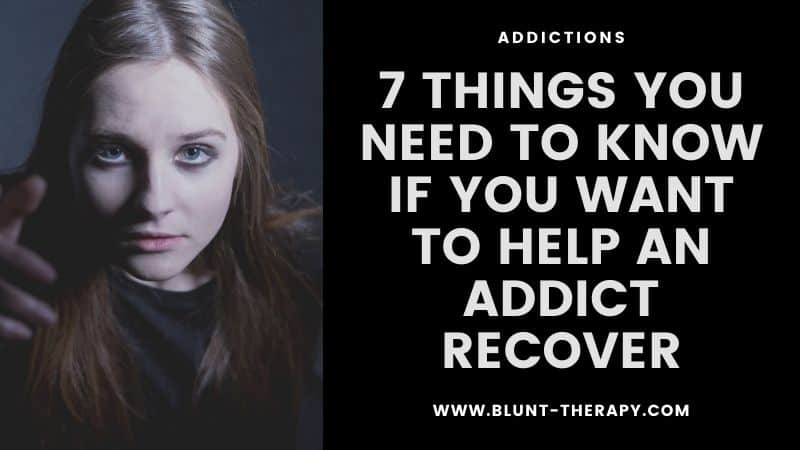Table of Contents
Affiliate link notice: As an affiliate of BetterHelp and other third-party vendors, We will receive compensation if you make a purchase using the links provided on this page. For more information, visit our disclosure page.
Last Updated on December 14, 2021 by Randy Withers, LCMHC
Maybe it’s your kid. Maybe it’s a friend or teacher. It’s someone near you, anyway, and all you know is their personality has changed.
Now they lie and steal money and care little about the fact that they’re breaking your heart. Sometimes you support them just to keep things calm, sometimes you stand up to stop it, but there’s part of you that’s mortified, and there’s another part that’s angry, and sometimes you say all the right things in the wrong way. You’re exhausted.
Sound familiar? If you care about someone with a drug or alcohol problem, you know more than anyone how it goes: There’s no easy solution. However, there are things you can do – and things you probably shouldn’t. You’ll find a list of DOs and DONTs below.

How To Help Someone With A Drug Problem
The DO’s
Set boundaries.
Boundaries are meant to help you protect yourself, do what’s best for the addict (even though they might not see it that way), and improve the health of the relationship.
For some, boundaries mean no contact. For others, that means forbidding drugs in the house, expecting rent, requiring random drug tests, or understanding there is to be no talk about illegal substances with siblings. For still others, it means not posting bond or paying their debt. However, no matter what the case, don’t use boundaries to punish or shame.
do Offer advice carefully. Make your recommendations more powerful by making simple, direct statements rather than prolonged lectures. It’ll be tempting to say it all, and there’s a lot to say, but focus on the important parts. The less said, the more it’s heard.
Promote Abstinence.
Enable sobriety. If reasonable, offer rides to doctors’ appointments, support groups, twelve-step programs, rehabilitation, and anything else that promotes recovery. If your friend or family member is trying not to use, congratulate them for each new day they stay sober.
Encourage small steps.
Invest your energy in the short term. Think small goals. Focus on helping your loved one stay clean and pursue treatment – before insisting they get a job, go back to school, or start saving up for an apartment.
Adjust your expectations according to “where they are” and applaud efforts and achievements.
Remind Them To See Their Doctor.
It’s hard to beat something as big as addiction when one is struggling with depression, diabetes, chronic pain, toothache, and other problems. Encourage your loved one to get treatment and take their medications. But rather than pay high dollar for their care, have them search online for free and low-cost medical resources.
Take care of yourself.
This one is vital. Put yourself first. Find time to do things that have nothing to do with addiction.
If there’s no room for you, if your loved one’s problem has taken over your life, it’s time to tighten your boundaries. Invest time in yourself. If things are bad, touch bases with a psychotherapist to separate yourself from their problem.
The DON’Ts
don’t ridicule or threaten.
You’ll be angry or hurt at times, but avoid taking it out on the person who is using. Criticizing, yelling, and violence only push them farther away from you and bury them deeper in their addiction.
Don’t help them use drugs.
Don’t enable addiction. This means don’t make excuses for them. Don’t pay for their mistakes. Don’t shield the addict from their addiction. People are more likely to change if they aren’t rescued from the negative consequences of their actions.
don’t WORK HARDER THAN THEY DO.
Look at what your loved one is doing (and not doing) to pursue recovery, and match their efforts – and do nothing more. Don’t spin your wheels.
It’s important you don’t take responsibility for their recovery. It’s up to them to avoid triggers, deal with the consequences of drug use, and seek out rehab. If you do match their efforts, don’t do things for the addict but instead show them how to do these things. You can assist if they need it, but make sure they carry the reins in the process. Never work harder than they do.
don’t offer cash, cars, and hotel ROOMS.
If you want to provide financial support, buy low-cost goods instead of providing money and expensive items. Gift cards for small amounts at the local supermarket might be an option. If your loved one is serious about recovery, share food, buy them a couple shirts, and show them how to look for a job.
If they have many needs, have them research community resources online. But don’t give them cash, cars, hotel rooms, and other items they can use to feed their addiction.
Final Thoughts
Caring about someone with an addiction can drain you. But there are ways to engage with them in a healthy way.
It’s a careful balance: plan to encourage independence and promote sobriety while setting healthy limits and taking care of yourself. If they need assistance, never put in more effort than they do. If they’re not ready to accept help, just leave the proverbial light on until your friend or family member is ready to come home.
Resources
For more information, check out Questions about substance abuse and addiction. The National Institute of Drug Abuse also has great articles for helping a loved one with addiction.
Need more recovery material? Check out kimrosenthalmd.com, home to more than 100 articles and a gaggle of low-cost and free booklets. Please visit and hang out a while!










This post is very easy to read and understand without leaving any details out. Great work!Thanks for shearing this valuable and helpful article.